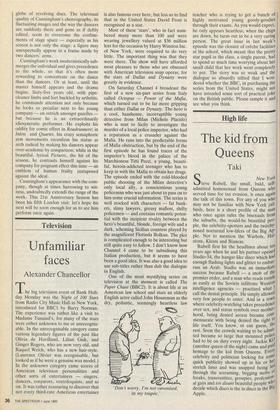Television
Unfamiliar faces
Alexander Chancellor
The big television event of Bank Holi- day Monday was the Night of 100 Stars from Radio City Music Hall in New York, introduced for BBC1 by Barry Norman. The experience was rather like a visit to Madame Tussaud's, for many of the stars were either unknown to me or unrecognis- able. In the unrecognisable category came various legendary figures of the past like Olivia de Havilland, Lilian Gish, and Ginger Rogers, who are now very old, and Raquel Welch, who has a new hair-style. (Laurence Olivier was recognisable, but looked as if he were a genuine wax model.) In the unknown category came scores of American television personalities and other sorts of entertainers — singers, dancers, conjurors. ventriloquists, and so on. It was rather reassuring to discover that not every third-rate American entertainer
is also famous over here, but less so to find that in the United States David Frost is recognised as a star.
Most of these 'stars', who in fact num- bered many more than 100 and were wearing jewellery valued at $36 million lent for the occasion by Harry Winston Inc. of New York, were required to do very little. The important thing was that they were there. The show will have afforded most pleasure to those who are obsessed with American television soap operas, for the stars of Dallas and Dynasty were greatly in evidence.
On Saturday Channel 4 broadcast the first of a new six-part series from Italy called Octopus — Power of the Mafia, which turned out to be far more gripping than either Dallas or Dynasty. The hero is a cool, handsome, incorruptible young detective from Milan (Michele Placido) who is sent to Sicily to investigate the murder of a local police inspector, who had a reputation as a crusader against the Mafia. He runs into the predictable forms of Mafia obstruction, but by the end of the first episode he has found traces of the inspector's blood in the palace of the Marchioness Titti Pecci, a young, beauti- ful, heroin-addicted teenager who has to keep in with the Mafia to obtain her drugs. The episode ended with the cold-blooded public shooting of the Milan detective's only local ally, a conscientious young policeman who was just about to pass on to him some crucial information. The series is well stocked with characters — fat bank- ers, slimy lawyers, greasy mafiosi, shifty policemen — and contains romantic poten- tial with the incipient rivalry between the hero's beautiful, blonde, foreign wife and a dark, scheming Sicilian countess played by the magnificent Florinda Bolkan. The plot is complicated enough to be interesting but still quite easy to follow. I don't know how Channel 4 came to be subsidising this Italian production, but it seems to have been a good idea. It was also a good idea to use sub-titles rather than dub the dialogue in English.
One of the most mystifying series on television at the moment is called The Paper Chase (BBC2). It is about life at an American law school and stars an elderly English actor called John Houseman as the dry, pedantic, seemingly heartless law 'n(m't worry, I'm not canonised„ its my toupee.' teacher who is trying to get a bunch of highly motivated young goody-goodies through their exams. As you would expect, he only appears heartless; when the chips are down, he turns out to be a very caring person. The great issue in last week's episode was the closure of creche facilities at the school, which meant that the pretty star pupil in the class, a single parent, had to spend so much time worrying about her small child that her work went completely to pot. The story was so weak and the dialogue so absurdly stilted that I won- dered whether the BBC, in purchasing the series from the United States, might not have intended some sort of practical joke on the British public. Please sample it and see what you think.


















































 Previous page
Previous page